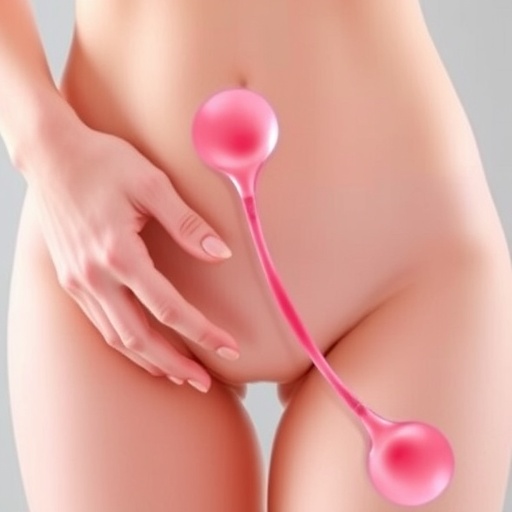A revolutionary study from researchers at the University of California San Diego introduces a groundbreaking hydrogel that may significantly alleviate the symptoms associated with menopause, particularly suffering from genitourinary syndrome of menopause (GSM). This condition affects a substantial percentage of women over the age of 40 and manifests through symptoms like vaginal dryness and discomfort, impacting their quality of life. The findings of this research are crucial, paving the way for a hormone-free alternative treatment that deliberately targets the underlying issues caused by menopausal changes.
Karen Christman, a leading figure in bioengineering at UC San Diego, emphasizes the innovative design of this hydrogel. The material is formulated specifically for use in vaginal tissues, providing a targeted response to the degradation of tissue typically seen in menopausal women. With GSM reportedly impacting around 85% of women in this demographic, and with prevailing treatments often unsatisfactory, the need for efficient alternatives is both urgent and compelling. This innovative hydrogel treatment presents a very significant step forward in that journey.
The hormonal fluctuations inherent to menopause can lead to a complex array of physiological changes impacting women’s reproductive health. The vagina’s soft tissue undergoes some of the most pronounced changes, including thinning of the mucosa and a reduction in the supportive layers of connective tissues and smooth muscles. Such alterations not only result in discomfort but also contribute to broader health challenges. The introduced hydrogel could address these issues at a fundamental level by promoting healing and restoration of the tissue architecture.
The current gold-standard treatment for GSM remains low-dose vaginal estrogen therapy, an effective method known to thicken the vaginal lining. However, this approach fails to address the deeper layers supporting vaginal function and overall pelvic health. Many women are hesitant to use hormone treatments, often stemming from fears over increased cancer risks—an apprehension underscored by clinical studies suggesting that such risks may be overstated. The hydrogel offers a promising alternative that minimizes these risks and addresses the same underlying problems faced by many women during menopause.
In the research, rats were assigned to receive either varying concentrations of the hydrogel or alternative controls over a two-week period. The results were illuminating: the vaginal tissues treated with the hydrogel showed remarkable similarities to those in pre-menopausal states. Increased smooth muscle thickness was noted, demonstrating the effectiveness of the hydrogel in restoring not just superficial appearance, but deeper functional capabilities of the vaginal wall. The researchers also noted that a higher concentration of the hydrogel correlated with improved outcomes, which may inform future dosage recommendations.
Particularly noteworthy was the hydrogel’s interaction with immune cells in the vaginal environment. Researchers detected an influx of macrophages that played a critical role in tissue repair, suggesting that the hydrogel’s application could stimulate a regenerative response. This interaction marks a pivotal discovery, offering insight into how biomaterials can influence not just the structure of vaginal tissues but their functional recovery and resilience as well.
No adverse safety effects were observed during the two-week treatment trial, with researchers expressing optimism about the hydrogel’s potential. As a next step, the team aims to extend the study’s duration and outcomes analysis while exploring different dosing regimens. The ongoing research could ultimately lead to a more convenient administration schedule, potentially allowing for less frequent application, which many patients would appreciate.
The multidisciplinary approach taken by this research team highlights the necessity of combining expertise across bioengineering, reproductive health, and clinical practice to tackle women’s health challenges effectively. Such collaborative efforts may yield treatment options that genuinely resonate with women’s needs and expectations during a pivotal life stage.
This innovative research has received vital support from various health institutions, including the National Institutes of Health, underscoring the significance of funding in advancing women’s health. Christman, now a co-founder of a biotech venture focused on similar tissue engineering, continues to advocate for innovative solutions within the realm of regenerative medicine.
The potential impact of this hydrogel product, if further validated through larger studies, could fundamentally reshape the landscape of menopausal care. Offering women a safe, hormone-free option for treating GSM symptoms aligns both with patient desires for less invasive treatment modalities and the healthcare system’s ongoing evolution toward personalized medicine.
The journey of transforming this hydrogel from experimental research to a clinically available product will undoubtedly be monitored closely by healthcare providers and patients alike, eager for effective solutions to a multi-faceted issue affecting millions. Anticipation grows as the scientific community waits for further results from extended investigations to determine the full range of this intervention’s benefits.
As understanding grows around the physiological impacts of menopause, scientific innovations aimed at improving women’s health are more essential than ever, echoing the commitments to enhancing quality of life through advanced medical research. The subsequent studies will hopefully bring clarity on dosing frequency, long-term efficacy, and safety profiles, leading to the hydrogel’s ultimate integration into clinical practice for the benefit of women everywhere.
With advancements like these, the prospects for improved treatments in women’s health are bright and beckoning, as the hydrogel represents not just a treatment option, but a statement of progress in addressing the complex needs of women during and beyond menopause.
Subject of Research: Animals
Article Title: Development of a vaginal extracellular matrix hydrogel for combatting genitourinary syndrome of menopause
News Publication Date: 2-Aug-2025
Web References: Advanced Materials
References: None
Image Credits: Credit: University of California San Diego
Keywords
Bioengineering, Biomedical Engineering, Biochemical Engineering, Obstetrics.




